God of War: Ascension Review
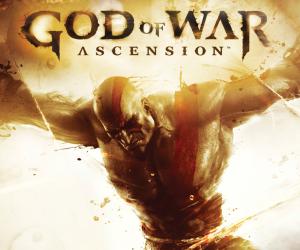 Game: God of War: Ascension
Game: God of War: Ascension
Developer: Sony Santa Monica Studio
Publisher: Sony Computer Entertainment
Available on: PlayStation 3 only
If you had to do a psychiatric evaluation of Kratos, the skin-headed, tattooed protagonist of Sony Santa Monica’s God of War series, chances are you’d conclude that, mildly put, not all his dogs are barking. And who can really blame him? Tricked into murdering his family by the God he swore to serve, and then forced to carry their ashes around bonded to his skin for eternity, betrayed, lied to, deceived and killed at least twice (at the last count), he’s hardly had the rosiest of lives since that fateful day when he swore a blood-oath to Ares.
And yet he owes his popularity to his mental instability, as his single-minded quest for brutal vengeance has kept people hooked to the series for five whole games so far. This latest offering from Sony’s Santa Monica Studios is the sixth game in the series (not including mobile title Betrayal), the third prequel to be released, and chronologically the first entry in the story arc. You’d think it would be confusing, but it really isn’t – all you really need to know in a God of War game is that Kratos is pissed off, and the only way to shake his thirst for revenge is to commit horrific acts of deicide.
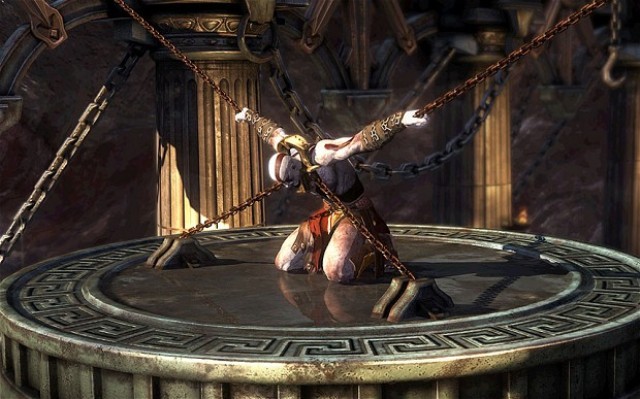
STORY: God of War: Ascension pre-dates every game in the series released so far, leaving Kratos’ ultimate fate just as ambiguous as it was at the conclusion of the excellent God of War III. The story takes place six months after Kratos murdered his wife and child, and begins with him imprisoned by the three Furies for attempting to break the blood-oath.
Being set before the entire series, you get to see a much more human protagonist, still in pain over the loss of his loved ones and yet to embark upon his God-slaying odyssey – and yet, when taken as a whole, Ascension feels a little like a wasted opportunity. The crux of the narrative is Kratos’ pursuit of the Furies, whose chains you slip in the opening moments of the game. Although bonded to Ares, Kratos is still mortal, a man broken by loss and stitched back together by hatred – but it’s not really a side to him we haven’t already seen. With a past so well-documented, there’s little about the former Spartan warrior that we don’t already know, and I can’t help but feel that Ascension should have gone back to when it all began, shown us Kratos as a man, a husband, a father, a soldier, and told in detail the events leading up to the swearing of his oath to Ares. As it is, Ascension doesn’t do that, and instead fills in yet more story of Kratos’ ten years of servitude. In fact, it tells largely the same violent, shouty, gore-strewn tale that we’ve become accustomed to, one that will please stalwart fans and interest newcomers but will leave those hoping for a deeper understanding of Kratos out in the cold.
That being said, the script and voice-acting are characteristically ace, and the story itself is enjoyable and engaging even if it rarely steps outside the established comfort zone. There are a few brief forays into Kratos’ past, including the much-publicised flashbacks of surprisingly tender moments with his family, a handful of which do bring out a different side of the raging Spartan. Without spoiling the story, there are moments – particularly towards the end of the narrative – that make you care about Kratos in a way that was previously unheard of, as he is literally forced to face the ghosts of his past and put them to ground. On a scale beside the violence and ire that has characterised the series, it seems a relatively small thing but, perhaps because it finally shows Kratos as something other than a seething hate-machine, it arguably has more impact than it has a right to.
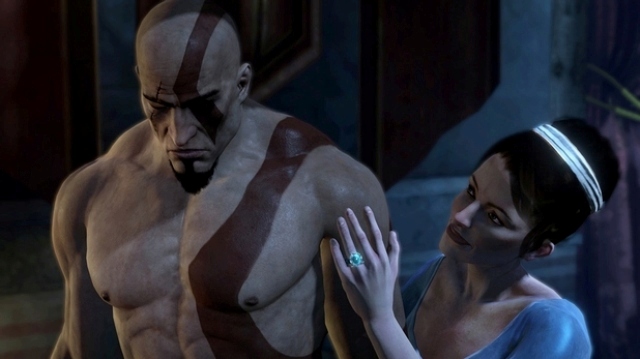
Still, that Ascension follows the same familiar ground as every other entry in the series is not a great criticism, as huge-scale, epic combat and bloody-minded vengeance are what you come to a God of War game expecting – but it would have been nice for Ascension to take a few more risks with the plot, and perhaps explore some truly fresh ground.
GRAPHICS: Using a re-tooled version of their God of War III Engine, Santa Monica have surpassed themselves in the visual department, creating a world more vivid and darkly beautiful than anything in the series so far. God of War level designers could never be accused of under-confidence, and they’ve never been afraid to take the term “epic adventure” to new heights; Ascension is no different. The sense of scale is, at times, immense, as the game camera pulls away from the action by hundreds of virtual feet until Kratos becomes just a tiny dot hacking away at more tiny dots. It’s occasionally disorienting and caused me to die more than once, but it remains incredibly effective all the same.
The overall aesthetic, while impressively detailed and dripping with atmosphere, maintains the “traditional” God of War palette of blood red, coal black and burnished gold, but outdoor levels (such as the opener during which Kratos battles against the mountain-sized Aegean the Hecatonchires) are simply stunning, using muted pastel colours in place of the usual violence-inducing hues associated with the series. Once again, the emphasis is often on size where the bosses are concerned, and each screen-filling monstrosity is just as richly detailed as the blade fodder thrown at you throughout the levels. Kratos himself has undergone no overhauls, thankfully, returning exactly as he left us at the end of God of War III, but his movements are slicker, quicker and pack just slightly more visible impact than ever before.
SOUND: The soundtrack to God of War: Ascension is an almost even split between rousing, epic orchestral music composed by Tyler Bates (whose previous credits include 300, Doomsday and Marcus Nispel’s Conan the Barbarian) and Kratos’ grunting, growling and roaring. As a mix it’s effective, and if you’re in any doubt as to the protagonist’s frame of mind, a few minutes listening to him scream in rage as he tears a Gorgon’s head off will clear it up.
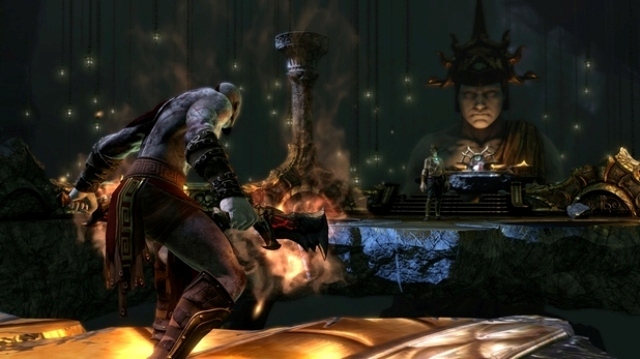
The voice acting is brilliant throughout as series mainstay Terrence C. Carson is joined by Linda Hunt and the lovely Jennifer Hale to bring the characters to life in fully motion-captured cutscenes that convey the actor’s emotions excellently. Combined with the ambient sounds – a by-now familiar amalgamation of agonised weeping, otherworldly roaring and lots and lots of steel on steel and rending flesh – the high-quality voice-work and evocative score generate an atmosphere that is unmistakably God of War.
GAMEPLAY: Not a great deal has changed since God of War III in terms of the mechanics themselves, but Kratos does have a few new tricks up his leather kilt – which always feels a bit odd in a prequel. For example, he’s now able to imbue the Blades of Chaos (the iconic chained scimitars he’s wielded since day dot in one incarnation or another) with elemental properties, bringing to bear fire, ice, lightning and soul magic that affects enemies and the environment in different ways.
The Rage Meter returns, filling up with every successful hit and increasing the arcade feel of the combat. Perhaps because the perspective sometimes shifts in a level to leave you squinting at a tiny, distant Spartan warrior, the combat occasionally stoops to full-on button-mashery. These moments are rare, however, and the frustration is swamped by awe as Ascension’s epic scope slaps you in the face.
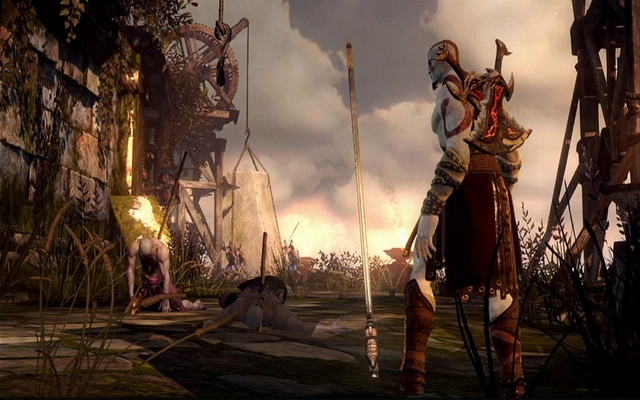
In a departure from tradition – and in keeping with the prequel nature – Kratos doesn’t collect new alternate weapons as in previous titles. Instead, his primary weapons are always the Blades of Chaos and their various magical properties, but he can pick up temporary secondary tools from the environment and enemies. Throwable spears, clubs that launch opponents into the air, slings that fire explosive projectiles and shields that act as battering rams are scattered around each level, allowing you to switch tactics and weapons mid-combo. Factor in the magical attacks and special moves (all dependant on which element is selected), and the combat system becomes fairly comprehensive. Series fans will also notice that Circle is no longer the grab button, and now controls the secondary weapon instead – grabs are now performed with Kratos’ chains via the R1 button. Thankfully, context-sensitive executions are present, correct and as nasty as you want them to be.
I can’t really talk about the gameplay without mentioning Quick Time Events (QTEs) as, for better or worse, the franchise is renowned for them. They make a comeback here, as large-scale and pleasingly-psychotic as ever, and add a sense of blockbuster spectacle to proceedings whether you’re scaling a thousand-foot Titan, spilling the brains of an Elephantaur or leaping from point-to-point on the back of a giant mechanical serpent.
There are no real issues where God of War: Ascension’s gameplay is concerned, other than that it all feels very “safe”. I don’t mean easy (although it is considerably less taxing than God of War III), but rather that it doesn’t stretch itself beyond the boundaries of what has come before and so doesn’t feel much like a true progression of the series. It’s as playable as any entry in the franchise, but beyond the OTT environments and enemies – both of which are impressive largely thanks to their appearance alone – it failed to genuinely wow me.
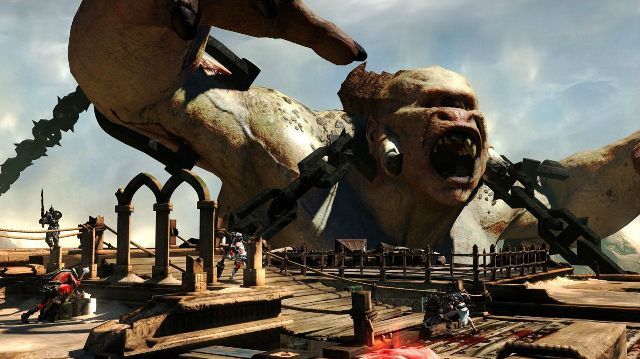
MULTIPLAYER: Many will question why a multiplayer mode was introduced to the God of War series, but after a few hours with it, you’ll understand the reasons behind it. The online element here is incredibly deep, with a ton of unlockables and a nice selection of modes. You might be forgiven for thinking that all it entails is hulking meatheads chopping one other asunder – and admittedly, that is a major part of it – but there are many optional objectives you can carry out to keep your head, especially if you’re not in the zone and are repeatedly ending up as fodder.
For example, there’s a variety of usable traps of the flame or bed-of-spikes persuasion, and these will either kill or damage your enemies to slow them down, meaning you can score kills just by being sneaky, which, in all honesty, is ace. Grabbing chests not only unlocks items for character customisation, but also gains “favour” for your team, which is the score currency used in Ascension. Capture the Flag is a lot of fun, because it adds another objective besides killing – which is fun in itself thanks to the traps you can set and various environment hazards, not least the colossal monstrosities placed at key locations in each map, some of which are controllable.
The combat works surprisingly well in the multiplayer arena, though over-levelled fighters will pose a problem for players just starting out unless they quickly learn that heavy attack is a block-breaker. As you progress through the level rankings you’ll be able to equip new weapons and armour (of which there are 3 types: head, body, and lower body), which alter your stats and make you stronger in specific areas. A tutorial before you get started asks you to align yourself with a certain God (Zeus, Ares, Poseidon or Hades), which basically amounts to which magic you get to use. After this, you can select any of the weapons you wish, and upgrade your magic, too – you can even change allegiance if you wish.

On top of all of this (and hopefully you’re getting the idea that the multiplayer is enormously deep) there are “Labours”, which are goals such as scoring a set number of kills or interacting with the environment in a certain way. Skill points are rewarded as you level up, which you can put into magic or relics to upgrade them, but the overall goal is to advance your warrior as far as you can. It’s an interesting take on the traditional load-out system, for sure.
Rounding off the modes such as 4v4, 2v2, Free for All and Capture the Flag, is a co-op mode called Trial of the Gods. This is a wave-based mode where you and a friend (no more than two players, sadly) go up against waves of increasingly tough enemies – all while the clock is ticking away and you’re forced to kill quickly and efficiently to extend your time. This mode is actually also playable solo, but it’s far more fun with a friend.
For all the concern and questioning, Santa Monica have put together a robust multiplayer mode in a very clever way, made it accessible to everyone and given plenty of reasons to play it repeatedly. There may not be a huge volume of maps, but the ones that are there are clever, dynamic (some of them literally move as you play) and gorgeous to look at.

LONGEVITY: Ascension’s campaign will take around seven to eight hours to complete on normal, placing it roughly on par with the series’ average. Collectibles are slim on the ground, with little reason to explore besides artefacts that can’t be used until you’re on your second playthrough. The addition of a New Game+ mode is largely pointless as nothing will feel different aside from the fact that the aforementioned artefacts make everything a little bit easier and, as Ascension is already one of the easiest entries in the series in terms of raw gameplay challenge, that’s not a great invitation.
VERDICT: God of War: Ascension is a great game, of that there is no doubt. The problem is that aside from a handful of new abilities and an improved aesthetic, it’s incredibly similar to God of War III. The story offers none of the revelations promised by its intriguing premise, and as a result you feel you already know what’s coming long before you reach the credits. The greatest feather in its cap is the multiplayer element, something many worried was being shoe-horned in for the sheer hell of it but which has turned out, in actual fact, to be hugely enjoyable.
Overall, Ascension does God of War very, very well, but you have to wonder if it’s not time now for Kratos to have a bit of a lie down until a fully fleshed-out sequel is on the cards (indeed, in many ways this feels like a swansong release for the PlayStation 3 before Kratos takes his vengeance onto the next generation of consoles). Brutal, bloody, epic in scale and grandiose in its depiction of a violent and turbulent ancient Greece, God of War: Ascension is a worthy purchase for fans of the franchise.





